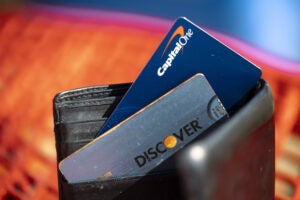Capital One is buying Discover – Should I be concerned?

As a cardholder, I have been with Capital One my entire credit journey. My first credit card was the Capital One VentureOne Rewards Credit Card and, after years of reliability and rewards, I added a debit card with them as well. I’ve never had an issue with customer service or the use of my credit card; on the rare occasions I had smaller issues, they were resolved very quickly. Because of that, I’ve never had concerns about being a Capital One customer… until now.
On Feb. 19, 2024, Capital One announced its acquisition of Discover Financial Services for $35.3 billion in a deal that includes Discover’s line of credit and debit cards, as well as its payment network. While Capital One CEO Richard Fairbanks is excited for the venture and expects the deal to position the combined institution to compete with the nation’s largest banks, I have a few concerns.
Concern #1: Will I lose my debit card if it moves to Capital One?
To a certain degree, this question has already been answered, as the company has announced that all Capital One debit cards will eventually be switched to Discover debit cards. As a consumer, I find this announcement to be somewhat off-putting, given my lack of choice in transitioning to a new network.
However, credit card expert and Bankrate writer Ryan Flanigan, believes this may be a bigger opportunity than non-Discover customers believe. “Discover has a better debit option, earning 1 percent on purchases,” he says.
The best move would be to move their debit cards to the Discover network to take advantage of this. However, the merger could change whether these terms continue to apply, so it bears watching.— Ryan Flanigan | Bankrate Writer
Concern #2: Will I lose my current rewards (or will they change for the worse)?
When it comes to credit cards, Discover has been a standout with its rotating reward setup, wide range of products and high customer satisfaction, ranking toward the top of J.D. Power’s U.S. Credit Card Overall Customer Satisfaction Rankings for well over a decade. But what does this mean for rewards on both Discover and Capital One? Hopefully, it means expansion.
“The best case scenario would be if you could interchangeably combine earnings from both programs,” points out Flanigan. “Imagine the potential of earning 5 percent cash back on rotating categories with your Discover it® Cash Back card and then converting those points into Capital One Venture X Rewards Credit Card miles. You could transfer those points to Capital One’s airline partners or use them to erase travel purchases. That’s a great value and provides excellent symbiosis between the programs.
“The precedent is already in place for a mechanism like this with flexible points,” he continues. “Chase and Citi already allow you to combine points from one card to another to maximize your value. Capital One also already lets you combine cash back from a Spark cash back card to a Venture card, so that would just need to be expanded to include the Discover cards.”
This optimism seems also to be shared by Capital One, which highlighted on an investor call the hope that Discover customers will engage in the Capital One “ecosystem,” including Capital One Travel, Capital One Shopping and its national bank.
Concern #3: Will I lose access to the benefits of Visa and Mastercard’s networks?
Discover Network is the smallest of the four major networks, falling behind Visa, Mastercard and American Express. While Capital One states that it will be working to expand Discover’s reach with domestic and international merchants, this is a big concern as someone who holds a Capital One travel card.
If my credit card is switched to the Discover network, it may no longer be as reliable as it was when it was connected to the Visa network. Not only could this impact the cards’ ability to work overseas, but it could also affect the rewards I’m able to earn.
This concern may not be a major issue, as Fairbanks proclaims that “Our research confirms that customers are very satisfied with [Discover’s] acceptance. But the perception of acceptance among non-customers lags the reality and internationally Discover still has room to grow.” He also goes on to say that the transition is likely to happen over time, creating hope that the network will expand before the company is ready to move forward with the switch.
The bottom line: Is it worth being worried?
Monumental deals like this always take time, and this one in particular isn’t looking to close until late 2024 or early 2025. According to Jonathan Hoddenbagh, an economist at Johns Hopkins University, consumers like me shouldn’t be concerned in the short term.
“Discover and Capital One credit card holders should be able to keep their cards for quite awhile without any disruptions,” he states. “An acquisition of this size and complexity will take many months to get regulatory approval. And if or when the merger goes through, due to its complexity and size, it will likely be some time before any attempt to consolidate or re-brand the distinct credit card businesses of Capital One and Discover.”
— Jonathan HoddenbaghEconomist at Johns Hopkins Unversity
Of course, there’s also the question of whether the merger will even be allowed to happen, as federal regulators worry that the move could create a monopoly within the banking industry. The proposed Credit Card Competition Act could also affect the outcome of the deal, as it aims to cap swipe fees and address the perceived duopoly of Visa and Mastercard in the card network space.
For me, this is a relief, as it gives me time to evaluate my finances and think about what I’d like most out of the merger and how it could affect my financial goals. With that in mind, I’ll be keeping a close eye on the deal’s development, looking forward to its potential benefits — and making a backup plan if there aren’t enough.
Why we ask for feedback Your feedback helps us improve our content and services. It takes less than a minute to complete.
Your responses are anonymous and will only be used for improving our website.






